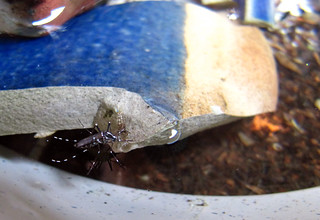Rainfall plus warm weather equals mosquito-breeding season
Fast Facts:
- The activity of mosquitoes is higher following summer rains; they need water to breed
- The production of mosquitoes is higher in warmer weather
- Pesticides are not enough to control mosquitoes over a long-term period
(503 words)
LITTLE ROCK – Last week’s warm-weather rain marathon has provided perfect conditions for the least favorite aspects of the Arkansas summer: mosquitoes.
“Always be aware that you’re going to have increased mosquito activity following summer rains,” said John Hopkins, an associate professor and extension entomologist with the University of Arkansas System, Division of Agriculture.
Not only are mosquitoes a nuisance, but certain species can also transmit diseases such as the deadly West Nile virus and the heartworm parasite to pets, Hopkins said.
The best way to control mosquitoes is with an area wide program covering a neighborhood, community, or county, but there are essential and easy things that anyone, especially homeowners, can do to prevent bites and potential diseases, Hopkins said.
Stop the breeding
“All a mosquito needs to breed is standing water containing a few leaves or small amount of organic material, which provides the microorganisms mosquito larvae use as food,” Hopkins said.
It is very important to look around outside your house to find things that hold water for more than a week and then dump, drain, or fill them. Buckets, wheelbarrows, cans, tarps over pools or boats, gutters, cisterns, and tire swings are among the most common things that hold water. These are places where mosquitoes can breed, Hopkins said.
In addition to dumping and draining, there are several products such as methoprene granules and mosquito dunks that people can add to standing water to prevent larval growth.
The chance for a mosquito population boom increases with the temperature, Hopkins said. The warmer the weather, the faster mosquitoes develop into biting adults.
Building a no-bite zone
When students are out of school for the summer, and families plan for outdoor activities in the backyard, mosquito adults can be temporarily suppressed by spraying/fogging with labeled insecticides targeting foliage and other mosquito resting areas.
However, this method comes with some potential risks such as adverse impacts on beneficial insects like butterflies and honeybees and possible drift into neighboring properties, Hopkins said.
Citronella candles and torches have been shown to provide relief from mosquito bites in areas where there is no air movement. Bug zappers provide very little mosquito control and actually kill more beneficial insects than pests. University research indicates that there is no evidence that ultrasonic mosquito repelling devices work. Electric or propane-powered suction traps have been found to work but only for a small area.
Along with the use of a mosquito repellant, wearing a long-sleeved shirt and long pants when going outdoors at night or early in the morning is the best personal protection.
The longest lasting mosquito repellent is DEET, which can provides up to six hours of protection from mosquito bites. For those wishing to use something else, there are alternative repellant products that contain lemon oil of eucalyptus or picaridin, although their repellant effects don’t last as long as DEET.
“Excluding mosquitoes from your home by keeping window and door screens in good repair is an additional way to protect yourself from nighttime biting mosquitoes,” Hopkins said.
For more information about entomology, visit www.uaex.uada.edu or contact your county extension office.
The University of Arkansas System Division of Agriculture offers its programs to all eligible persons regardless of race, color, national origin, religion, gender, age, disability, marital or veteran status, or any other legally protected status, and is an Equal Opportunity Employer.
By Kezia Nanda
For the Cooperative Extension Service
U of A System Division of Agriculture
Media Contact: Mary Hightower
Dir. of Communication Services
U of A Division of Agriculture
Cooperative Extension Service
(501) 671-2126
mhightower@uada.edu
Related Links

